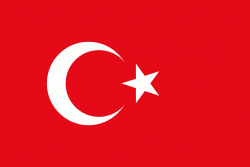Elâzığ Province (Elâzığ)
In 1927 the office of the Inspector General was created, which governed with martial law. The province was included in the first Inspectorate General (Umumi Müfettişlik, UM) over which the Inspector General ruled. The UM span over the provinces of Hakkâri, Siirt, Van, Mardin, Bitlis, Şanlıurfa, Elazığ and Diyarbakır.
In December 1935, the Tunceli Law was passed, which demanded a more powerful Government in the region. In January 1936 the Elazığ Province was transferred under the authority of the newly established Fourth Inspectorate General, which span over the provinces of Elazığ, Erzincan, Bingöl and Tunceli and its seat was in the city of Elazığ. The fourth UM was governed by a Governor-Commander. Most of the employees in the municipalities had to be from the military and the Governor-Commander had the authority to evacuate whole villages and resettle them in another part of the province. In 1946 the Tunceli Law was abolished and the state of emergency removed but the authority of the fourth UM was transferred to the military.
The Inspectorates General were dissolved in 1952 during the Government of the Democrat Party.
The province has experienced many earthquakes, including a magnitude 6.1 earthquake on 8 March 2010 and a magnitude 6.7 earthquake on 24 January 2020.
Map - Elâzığ Province (Elâzığ)
Map
Country - Turkey
 |
|
| Flag of Turkey | |
One of the world's earliest permanently settled regions, present-day Turkey was home to important Neolithic sites like Göbekli Tepe, and was inhabited by ancient civilisations including the Hattians, Hittites, Anatolian peoples, Mycenaean Greeks, Persians and others. Following the conquests of Alexander the Great which started the Hellenistic period, most of the ancient regions in modern Turkey were culturally Hellenised, which continued during the Byzantine era. The Seljuk Turks began migrating in the 11th century, and the Sultanate of Rum ruled Anatolia until the Mongol invasion in 1243, when it disintegrated into small Turkish principalities. Beginning in the late 13th century, the Ottomans united the principalities and conquered the Balkans, and the Turkification of Anatolia increased during the Ottoman period. After Mehmed II conquered Constantinople (Istanbul) in 1453, Ottoman expansion continued under Selim I. During the reign of Suleiman the Magnificent, the Ottoman Empire became a global power. From the late 18th century onwards, the empire's power declined with a gradual loss of territories. Mahmud II started a period of modernisation in the early 19th century. The Young Turk Revolution of 1908 restricted the authority of the Sultan and restored the Ottoman Parliament after a 30-year suspension, ushering the empire into a multi-party period. The 1913 coup d'état put the country under the control of the Three Pashas, who facilitated the Empire's entry into World War I as part of the Central Powers in 1914. During the war, the Ottoman government committed genocides against its Armenian, Greek and Assyrian subjects. After its defeat in the war, the Ottoman Empire was partitioned.
Currency / Language
| ISO | Currency | Symbol | Significant figures |
|---|---|---|---|
| TRY | Turkish lira | ₺ | 2 |
| ISO | Language |
|---|---|
| AV | Avar language |
| AZ | Azerbaijani language |
| KU | Kurdish language |
| TR | Turkish language |
















